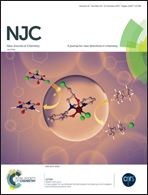Highly efficient approach for hypochlorous acid sensing in water samples and living cells based on acylhydrazone Schiff base functionalized fluorescent probes†
Abstract
A series of novel and convenient fluorescent probes with unique acylhydrazone Schiff base functional moiety were designed and presented for sensing HClO in biological and environmental water samples with outstanding sensitivity, photostability and selectivity over other ROS/RNS, ions and biomolecules, through the irreversible HClO-promoted oxidation and hydrolyzation reaction in formation of the ring-opened product, fluorescein. The successful detection of HClO in swimming pool water and tap water samples, as well as cell imaging in living L929 and MG-63 cells, indicates that the probes not only help in the determination of the HClO concentration in practical water samples, but also serve as promising tools to exploit and elucidate the functions of HClO in biological cells, organisms and processes.



 Please wait while we load your content...
Please wait while we load your content...